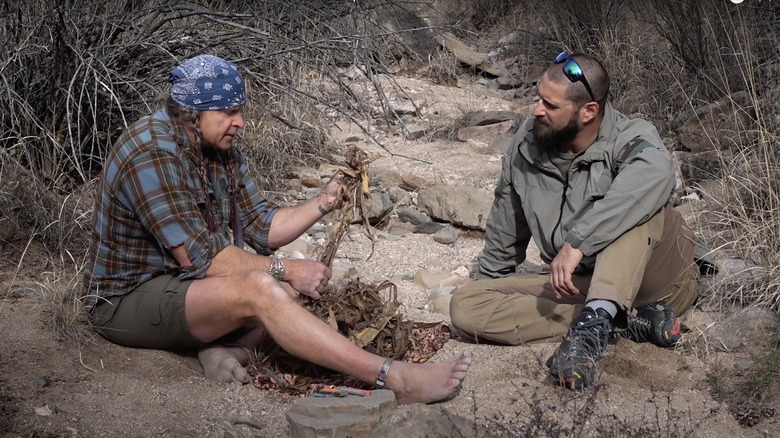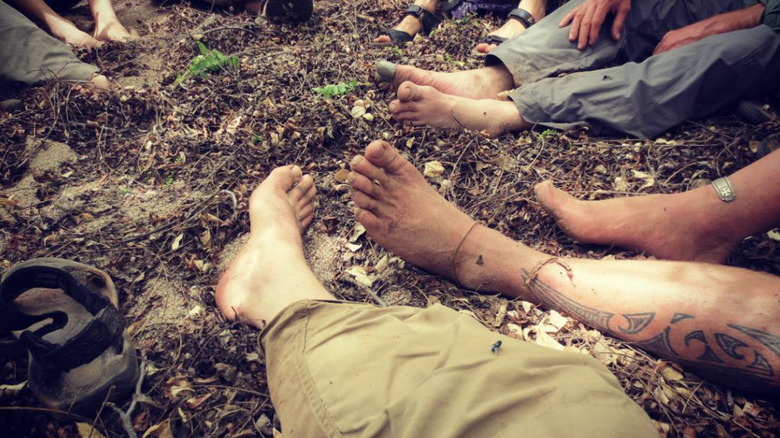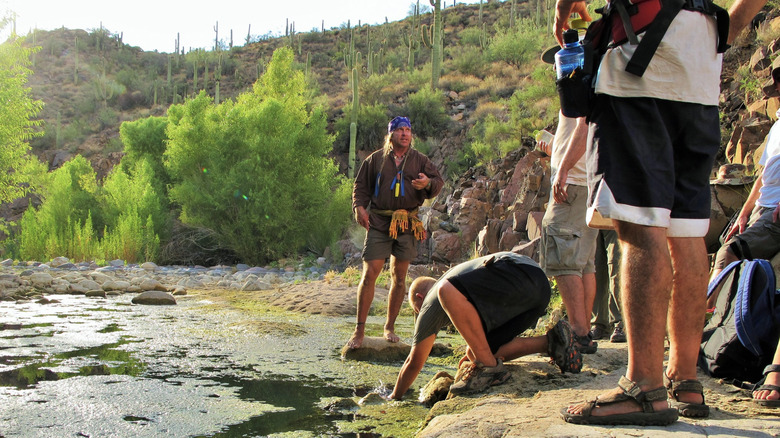Why Dual Survival's Cody Lundin Never Wears Shoes In The Outdoors
Footwear plays a pivotal role during outdoor excursions, serving as the foundation for a safe and enjoyable outdoor adventure. In fact, wearing the wrong hiking shoes can negatively impact one's performance and overall health. But, some people are questioning whether our emphasis on the need for specialized gear has gone too far. Are our bodies not inherently equipped to confront the elements? After all, our ancestors traversed outdoor terrain without shoes, relying on natural resilience and the adaptability of their feet and lower limbs. Figures like Cody Lundin champion this ancestral approach, opting to explore the outdoors without footwear altogether.
Fans of Cody may know him from his time co-hosting "Dual Survival," where he gained notoriety for his adeptness in overcoming challenging environments and thriving in the wild. An expert in survival, Lundin cultivated his instincts from an early age by immersing himself in the outdoors. Now, as founder of the Aboriginal Living Skills School, he has amassed over three decades of experience instructing survival enthusiasts, having trained thousands in primitive living and survival skills.
Cody caught the public's attention on "Dual Survival" when he disclosed his two-decade journey of walking unshodded, stating that this decision has conditioned his body and mind to adjust more effectively to extreme conditions. As a survival aficionado who's conquered the harshest of conditions, Cody may be onto something. What prompted him to take this step, and what insights has he gained? Read on to find out.
Stronger feet and legs
Cody asserts that barefoot walking has strengthened his feet. Since his decision to forgo shoes in the 1980s, Cody has found that the "free range of motion that [his] feet and ankles are forced to deal with" (via CodyLundin.com) has made his feet tough, just the way he likes.
Science also tells us that barefoot walking can strengthen your feet and legs. A review in Gait & Posture found that walking barefoot lessens the force with which the feet hit the ground. Without shoes, the feet can also better distribute the pressure of each step more evenly. This decreases the load experienced by your joints, contributing to their function and longevity. On top of that, a study in Arthritis & Rheumatism found that the weight of shoes itself can amplify pressure on lower limb joints, negatively affecting the health of hips and knees.
Wearing shoes can also change foot shape, causing them to become more narrow and less flexible. These changes to foot structure tend to be painful, cause inflammation, and negatively affect overall posture. On the contrary, barefoot walking rids your feet of dependence on shoes. Cody compares shoes to a "cast" or a "sling." Just like overuse of a cast would cause muscle atrophy, he says daily reliance on shoes reduces the capacity for your feet and ankle to support themselves. He attributes his "strong lower legs" to never "[putting his] foot in a cast" (via Conscious Connection Magazine).
Enhanced connection with nature
Cody has also gained another advantage from walking barefoot. As he wrote on this website, "I see more, I have better focus, I feel a greater connection to the planet; all very valuable survival traits."
Consider this: walking barefoot demands a heightened level of attention. Just like Cody says, without shoes, we must pay closer attention to our steps and surroundings, which can draw our awareness to details of the ground and even wildlife that we often overlook in our rush to get places. Therefore, in addition to the physical advantages, walking outdoors without shoes offers a straightforward and pleasurable method to unwind, declutter our thoughts, feel content, and foster a stronger connection to nature.
Cody's claim is supported by research. A study published in Landscape Research discovered that individuals walking barefoot exhibited greater connectedness to their surroundings than those wearing shoes, particularly when spending time in public gardens. Psychologically, this heightened sense of connection led to increased feelings of rejuvenation and restoration, which many of us desire amidst the hustle and bustle of urban living.
Why barefoot walking may not be for everyone, all the time
Though some studies have found short-term benefits of barefoot walking, others, like a review in Medicine & Science in Sports & Exercise, point out that we don't know much about the long-term effects. This uncertainty raises concerns about potential risks that individuals should consider. Walking without shoes may exacerbate discomfort for people with certain medical conditions or pose risks of injury. Outdoor terrain may be unsanitary or unsafe, littered with germs or sharp hazards that could cause injury or infection to unprotected feet.
Additionally, practical considerations also come into play. In modern society, many facilities enforce a dress code. Even Cody keeps a pair of flip-flops in his car so that he may "enter certain stores, restaurants, or to board airplanes" (via CodyLundin.com).
When asked if he hopes for others to go barefoot, Cody says no, encouraging people to merely "do what feels natural" to them. So, if completely abandoning your shoe closet doesn't appeal to you, there's really no pressure to do so, even if you're aiming to impress Cody should you happen to encounter him on a trail. In the end, walking barefoot allows for a unique sensory experience, enabling individuals to feel the texture of the ground beneath their feet and fostering a sense of connection with nature. By temporarily shedding the constraints of footwear, individuals may find relief from the pressures and constraints of modern life, experiencing a greater sense of freedom and mindfulness.



